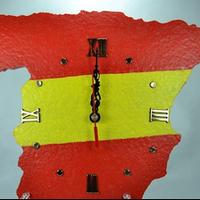21 ¡Viva el deporte!
21 Long live sports!
¡Viva el deporte!
Long live the sport!
Carlos: Karin, ¿qué deportes practican generalmente los alemanes?
Carlos: Karin, what sports do the Germans usually practice?
카를로스 : 카린, 독일인들은 보통 어떤 스포츠를합니까?
Karin: A muchos alemanes les encanta el deporte, por ejemplo: el alpinismo, la natación, el tenis, el esquí, el fútbol...
|||||||||||mountaineering||||||||
Karin: Many Germans love sports, for example: mountaineering, swimming, tennis, skiing, football ...
Carlos: A mí me gusta mucho ver un partido de fútbol aleman en la tele, juegan con mucha técnica.
Carlos: I really like watching a German football game on TV, they play with a lot of technique.
카를로스 : TV에서 독일 축구 경기를보고 싶어서, 많은 기술로 경기를합니다.
Karin: Carlos, ¿qué deporte practicabas cuando estabas en Argentina?
Karin: Carlos, what sport did you practice when you were in Argentina?
카린 : 카를로스, 아르헨티나에있을 때 어떤 스포츠를 연습 했습니까?
Carlos: En Argentina a mí me gustaba el tenis.
Carlos: In Argentina I liked tennis.
Se puede decir que siempre me ha gustado.
You can say that I've always liked it.
당신은 내가 항상 그것을 좋아했다고 말할 수 있습니다.
Karin: ¿Qué deporte le gusta a la gente en Argentina?
Karin: What sport do people like in Argentina?
Carlos: La gente en Argentina es fanática del fútbol.
||||||fan||
Carlos: People in Argentina are football fans.
Carlos : 아르헨티나 사람들은 축구 팬입니다.
También yo soy muy aficionado al fútbol.
||||fan||
I am also very fond of soccer.
나는 또한 축구를 매우 좋아한다.
De chico iba todos los domingos con mis amigos al campo de fútbol.
As a boy I went every Sunday with my friends to the soccer field.
소년 시절에 친구들과 매주 일요일에 축구장으로갔습니다.
Cuando el partido era bueno volvíamos a casa contentísimos y muy cansados.
When the match was good we returned home feeling very happy and very tired.
성냥이 좋았을 때 우리는 매우 행복하고 매우 피곤한 집으로 돌아왔다.
Karin: El sábado pasado Pedro y David fueron al estadio, jugaba el Real Madrid.
Karin: Last Saturday Pedro and David went to the stadium, played Real Madrid.
카린 : 지난 토요일 페드로와 데이비드가 경기장에 가서 레알 마드리드와 경기를했다.
Cuando llegaron a casa estaban muy sudorosos y sedientos..., quise ir con ellos pero ya no había entradas.
||||||sweaty||thirsty|||||||||
When they got home they were very sweaty and thirsty ... I wanted to go with them but there were no tickets.
그들이 집에 돌아 왔을 때 그들은 매우 땀 투성이 였고 목이 마르다. 나는 그들과 같이 가고 싶었다. 그러나 표가 없었다.
Cuando cerraron las taquillas me fui a hacer footing.
||||||||jogging
When they closed the lockers I went jogging.
그들이 사물함을 닫을 때 나는 조깅을하러 갔다.
Quisiera ver un partido de fútbol alguna vez: Real Madrid contra un equipo latinoamericano, por ejemplo de Brasil o Argentina...
I would like to see a football game once: Real Madrid against a Latin American team, for example from Brazil or Argentina ...
예전 브라질이나 아르헨티나 출신의 라틴 아메리카 팀을 상대로 한 레알 마드리드 (Real Madrid) ...
Carlos: Le voy a preguntar a José, él trabaja como vendedor en las taquillas del estadio Santiago Bernabéu.
Carlos: I'm going to ask José, he works as a salesman at the ticket offices of the Santiago Bernabéu stadium.
카를로스 : 호세에게 물어 보려합니다. 그는 산티아고 베르나베우 경기장의 티켓 판매소에서 세일즈맨으로 일합니다.
Karin: ¡Caramba!
|Wow
Karin: Gee!
카린 : 와우!
No está mal.
Not bad.
나쁘지 않아.
Sabes, ¿cuánto cuesta la entrada?
You know, how much does the ticket cost?
티켓이 얼마 죠?
Carlos: Depende, si es un partido nacional o internacional.
Carlos: It depends, if it's a national or international game.
카를로스 : 그것은 국가적 또는 국제적인 게임 이냐에 달려 있습니다.
Karin: Le preguntas a José, ¿vale?
Karin: You ask José, okay?
카린 : 호세에게 물어봐, 알았지?
Carlos: Sí, de acuerdo.
Carlos: Yes, okay.
¿Y tú juegas al tenis?
And you play tennis?
테니스를 치 다니?
Karin: No, fui a clase hace años, pero ... realmente a mí no me interesaba ni me gustaba mucho, pero ahora me gustaría hacer un curso.
Karin: No, I went to class years ago, but ... I did not really care or like it very much, but now I would like to take a course.
카린 : 아니, 몇 년 전에 수업에 들었지 만 ... 나는 그다지 신경 쓰지 않았거나 좋아하지 않았다. 그러나 이제 나는 코스를 가고 싶다.
Carlos: Bravo, ¡viva el deporte!
Carlos: Bravo, live the sport!
카를로스 : 브라보, 스포츠를 즐겨라!
Si quieres, podemos jugar mañana.
If you want, we can play tomorrow.
원한다면 우리는 내일 놀 수 있습니다.

